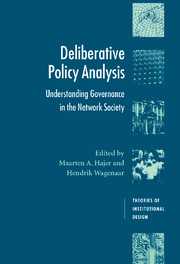Book contents
- Frontmatter
- Contents
- List of contributors
- List of figures
- List of tables
- Preface
- Introduction
- Part I Policy conflict and deliberation in the network society
- Part II Rethinking policy discourse
- 4 Democracy through policy discourse
- 5 Understanding policy practices: action, dialectic and deliberation in policy analysis
- 6 Reframing practice
- Part III Foundations of deliberative policy analysis
- References
- Subject index
- Author index
6 - Reframing practice
Published online by Cambridge University Press: 22 September 2009
- Frontmatter
- Contents
- List of contributors
- List of figures
- List of tables
- Preface
- Introduction
- Part I Policy conflict and deliberation in the network society
- Part II Rethinking policy discourse
- 4 Democracy through policy discourse
- 5 Understanding policy practices: action, dialectic and deliberation in policy analysis
- 6 Reframing practice
- Part III Foundations of deliberative policy analysis
- References
- Subject index
- Author index
Summary
How should we behave when ‘the business isn't what it used to be’? In a rough and ready way, this is the question that Maarten Hajer and Hendrik Wagenaar raise in the Introduction to this volume. They argue that the business of policymaking has changed. Policy issues are characterized by radical forms of uncertainty and an ‘awareness of the unwareness’ they generate; the institutions that used to guarantee stability and security are less effective in this role and may become sources of uncertainty themselves; difference plays a more prominent role in policymaking, as whatever consensus on values could be assumed as a base for political community and public policy has eroded. Society is diverse in ways that come into play directly in the policymaking process. Policymaking begins from these diverse roots and community is as often the outcome as the origin of policymaking.
In this chapter we discuss the implications these developments have for reframing as an aspect of governance, political action and policymaking. We examine reframing as one of the ways in which the synthesis these processes demand can occur. This is important because of the role frames play in policy beliefs. Reframing is more prominent in the kind of period that Hajer and Wagenaar describe, whether this is a transitional period or, as they suggest, a new era in which uncertainty and instability will endure as distinguishing features of many policy domains.
Information
- Type
- Chapter
- Information
- Deliberative Policy AnalysisUnderstanding Governance in the Network Society, pp. 172 - 206Publisher: Cambridge University PressPrint publication year: 2003
Accessibility standard: Unknown
Why this information is here
This section outlines the accessibility features of this content - including support for screen readers, full keyboard navigation and high-contrast display options. This may not be relevant for you.Accessibility Information
- 77
- Cited by
